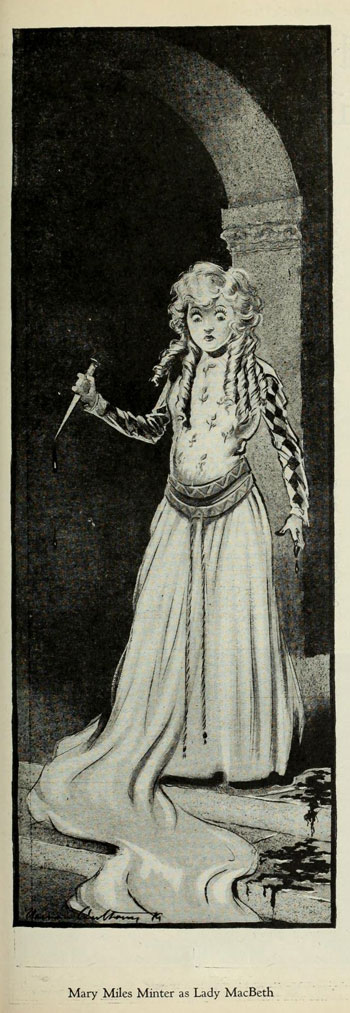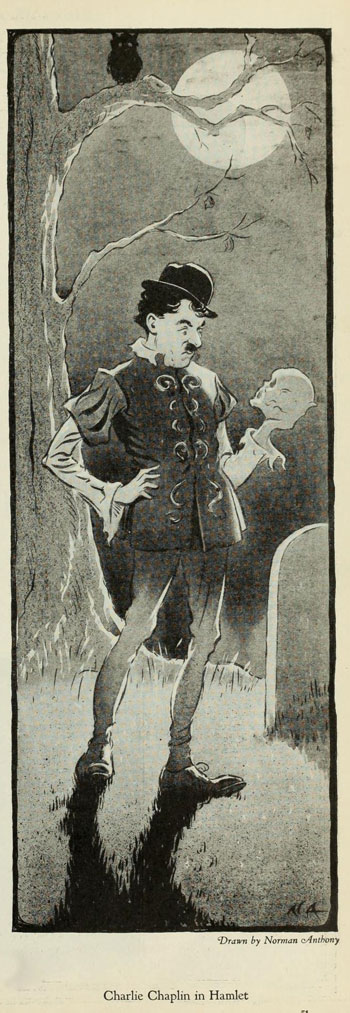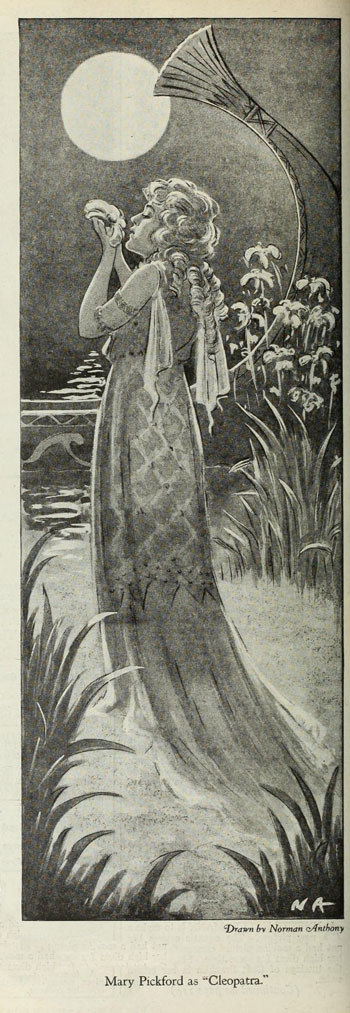Photoplay Magazine published a brief series showcasing the top stars of the day in what they considered to be wildly inappropriate roles, calling it “Photoplays We Don’t Care to See.” The illustrations by Norman Anthony are incredibly charming and I am afraid that the series had the opposite effect on me: I do very much care to see these imaginary pictures!

Mary Miles Minter was considered one of the top contenders for Mary Pickford’s sweetheart roles and so she would be an odd choice for Lady Macbeth… OR WOULD SHE? Those innocent blue eyes could have been turned sinister by the Scottish play and given her prominent place in the William Desmond Taylor murder just a few years later, this would have been a casting choice for the ages.

It’s safe to say that, like many other comedic superstars, Chaplin had more dramatic ambitions and why not Hamlet? Shave off the mustache, don some black tights and let’s go, Charlie! I’d watch.

Marion Davies actually played the role of Cecilia in a now-lost picture a few years before. I realize that Theda Bara is famous for her vamping but she did actually take a stab at more innocent fare with titles like East Lynne.

William S. Hart was known for his westerns, true, but the role of the famed Regency dandy Beau Brummel would not be entirely alien to him. Remember, Hart donned bracelets and a very short skirt to play Messala in the stage version of Ben-Hur.

I had to look this one up and it’s apparently about a father who kidnaps his daughter during a custody dispute and dedicates his life to making her happy. I really don’t see that as too far out of Douglas Fairbanks’ wheelhouse, just toss in some jumping scenes and we’re in business.

At this point in her career, Mary Pickford was trying her hardest to break free of typecasting and her dream role was Marguerite in Faust. While I would like to see an Egyptian woman play Cleopatra, I see no reason why a role of this type (tragic queen) should be out of Pickford’s range.
This series featured cute illustrations but it also showcased the kind of narrow-minded typecasting that hamstrung many a career. In fact, I dare say that the series should have been renamed “Photoplays We Would Love to See” because any one of these productions would certainly get my money.
☙❦❧
You can look up lots of swell clippings like these at the Media History Digital Library.
☙❦❧
Like what you’re reading? Please consider sponsoring me on Patreon. All patrons will get early previews of upcoming features, exclusive polls and other goodies.
Disclosure: Some links included in this post may be affiliate links to products sold by Amazon and as an Amazon Associate I earn from qualifying purchases.

oooo! Can you only imagine if Mary Pickford, or any of the others, had been cast in these roles – the results might have been truly great!
What a fun piece! But I agree that the drawings are the best part and that some of these actors might have broken their typecasting, and succeeded, if given the chance.
About Cleopatra, she was the last of a Macedonian Greek family dynasty that ruled Egypt for more than 300 years. The ruling family didn’t try to blend in: e.g., they stuck to Greek-speaking Alexandria, and didn’t marry Egyptians (in fact they were quite incestuous and showed the signs). In 300 years of ruling Egypt, only one of the family learned the Egyptian language: Cleopatra!
Unfortunately, the background of the Ptolemies has been used to lock women of color out of the Cleo parts for a while now. As Will Cuppy put it “they were Grade B if that” regarding Greekness and, in any case, neither Elizabeth Taylor nor Mary Pickford were Greek either.
Nor were Cleopatra actors Claudette Colbert and Theda Bara Greek or Egyptian! Though I gather that publicity for the 1917 Cleopatra pushed the idea that Bara was born outside the U.S., of an Arabic mother.
Thanks for reminding me of Will Cuppy, prompting me to read his hilarious quips about Cleopatra and her Roman lovers!
As for Cleopatra’s family background, among scholars it seems there’s no debate: mostly Greek with some Syrian in the blend. And that “blend” was weak from incest.
That said, I don’t doubt that over the years some people have believed that Cleopatra was Greek for wrong reasons, simply because the idea pleased their (racist) minds. I also don’t doubt that actors have been denied the role of Cleopatra for inappropriate, unfair reasons.
I just wish they would make some movie about the large and varied selection of other Cleopatras once in a while 😉
These are absolutely terrific! Thanks for sharing! (And goodness yes are th3 collections at the Media History Digital Library fun to explore!!)